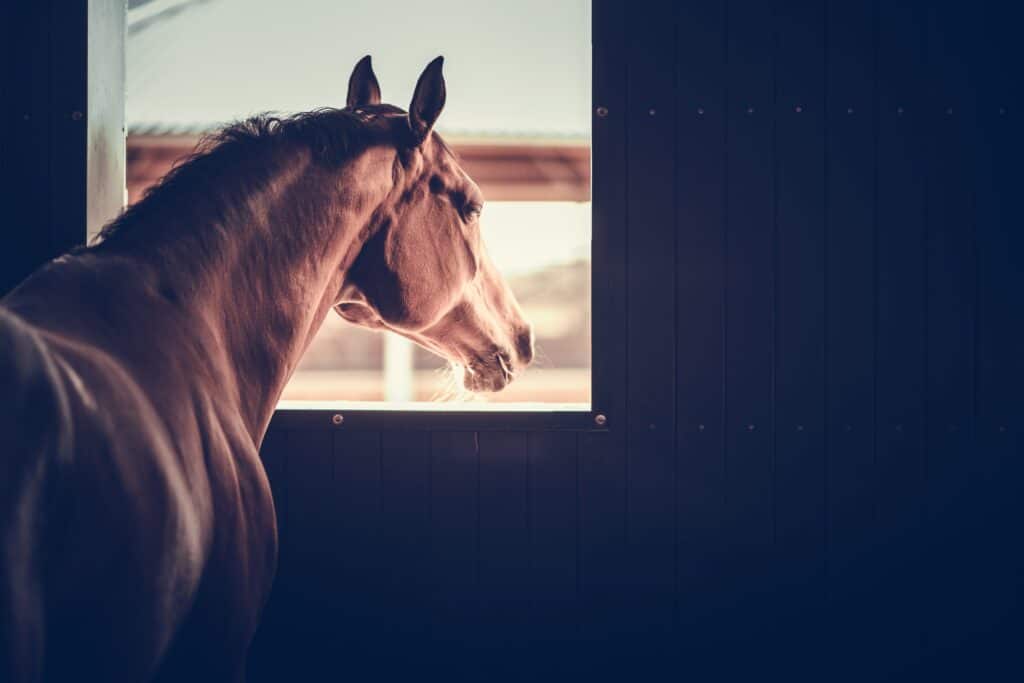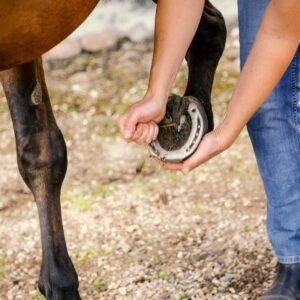Did you know that music can be a very effective tool for working with horses? Yes, horses like music. However, they aren’t crazy about all kinds of music. By using music in the correct way, we can help our horses to be more docile and willing to work with us. In this article, we will discuss why you should play music for your horse, and what kind of music horses like the best.
How Horses Use Hearing
Horses need to be sensitive to their environment for survival. As prey animals, they use hearing and sight to alert them to any dangers. A warning nicker from another horse in the herd will have the whole group on high alert.
Although horses’ hearing is similar to humans', they can detect sounds at higher and lower pitches than we can. A sudden grating sound can cause stress and anxious behavior. A very high-pitched sound can be painful. Take, for instance, the squealing of a microphone. If a squealing microphone hurts our ears, imagine what it is like to a horse.
The Benefits of Playing Music
Calming Effect
A calm, relaxed horse is not as likely to display dangerous behaviors, thus keeping themselves and us safer. Music can be a useful tool for keeping horses calm. If we teach our horses to associate music with being relaxed, we can use music during stressful situations to help our equine friends cope with stress.
A Sense of Safety
Taking a horse out of his home environment can be very stressful and scary for some horses. If we can keep things close to what they are at home, we can bring about a small sense of safety. For example, if you haul to a different barn for a competition, having his favorite tunes playing by his stall can help him feel more at home.
Masking Jarring Sounds
Thunderstorms or fireworks can play a number on the agitation levels of our equine friends. The loud, jarring sounds at irregular intervals keep them wondering when the next one will come and if they need to run from it. If they are in a stall, they don’t have the option to run away, which can add more to their frustration. Playing music in the barn can help mask irritating sounds.
How and when to play music for your horse
You want the music to have a calming effect. Remember, they have better hearing than we do, so do not have the volume up loud. Blaring the music at top volume will have the opposite effect of calm. It is better to have the radio on a shelf that is level with the horse’s head. Be sure it is out of their reach!
Play the music during certain times of the day, but not 24-7; they need a time of peace and quiet. Do you want music playing in your ear all the time? Well, some people do, but it is better to give our equine partners a break once in a while. As a rule, I turn the radio off during the night, unless a thunderstorm is forecasted.
Once your horse starts to associate music with being calm, you can use it during different situations to help them stay relaxed. Examples are farrier and veterinary visits, hauling in a trailer, etc. Music has also been used during post-surgery recovery.
The Research
Janet Marlow is a music composer who is internationally known for her role in understanding animal hearing sensitivities and how sound and music affect the behavior of dogs, cats, birds, and horses.
She has this to say about her research on Equine Wellness,
“In my clinical research over the past ten years, I’ve observed that horses prefer being in a barn with music as opposed to one without. Playing music helps balance equine behavior because it helps mask outside sounds and vibrations, such as tractor engines, high-pitched tools, thunder, and other intense sounds.”
She goes on to say that horses respond best to music with short melodies and strong rhythmic patterns. She recommends classical and country music played at a low volume.
Clare Carter and Linda Greening at Hartpury University did a clinical trial on “Auditory stimulation of the stabled equine; the effect of different music genres on behavior.”
The basics of the trial included exposing eight thoroughbreds to jazz, rock, country, and classical music. The horses were observed for behavior during the time of exposure to each genre of music. The results were that the horses were more relaxed when country and classical were played. The horses seemed to be more agitated during the jazz and rock sessions.
What Music to Play
The research tells us that jazz and rock are not the best genres to play for our equine friends. They prefer music with short melodies and strong rhythmic patterns, like those found in classical and country music.
It is ideal to have music playing on repeat. The horses are responding to the vibrations, not the words. They won’t get bored like we do. If you use a radio, be sure not to tune into an all-talk radio station.
After doing the research we mentioned above, Janet Marlow started Petacoustics.com. Pet Acoustics developed a product called Pet Tunes. Pet Tunes is a speaker system with downloaded music composed specifically for horses. They also have Pet Tunes for cats, dogs, and birds. The features of this handy speaker system are as follows:
- Bluetooth® Compatible
- Portable
- USB Charging Cable
- Continuous Play
- Lanyard Strap
- Can order more music to download
Final thoughts
A calm, relaxed horse is safer and more enjoyable to be around. Furthermore, they are also more willing to work with us. Playing music can have a calming effect while providing a sense of safety. Also, music can mask jarring sounds that keep horses hyper-vigilant.
Horse Courses by Elaine Heney
- Listening to the Horse - The Documentary by Elaine Heney & Grey Pony Films
- Shoulder In & Out Training for better balance, bend & topline development with your horse
- Over 110+ Polework Exercises & Challenges to Download
- Dancing at Liberty & Creating Connection with Your Horse (11 lessons) - Grey Pony Films
Although we may prefer a different genre of music, horses seem to prefer classical and country. I don’t typically mention a product in my articles. However, I do think the Pet Tunes speaker is worth checking out.
Did you learn something new about what music to play for horses? Let us know in the comments below!
Next, check out our article on horse sounds and their meanings.








